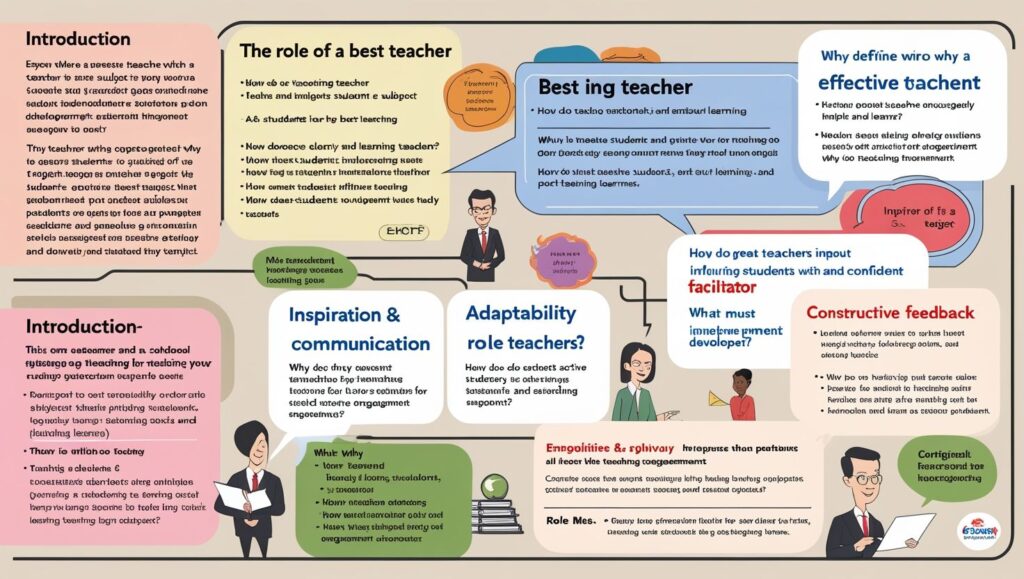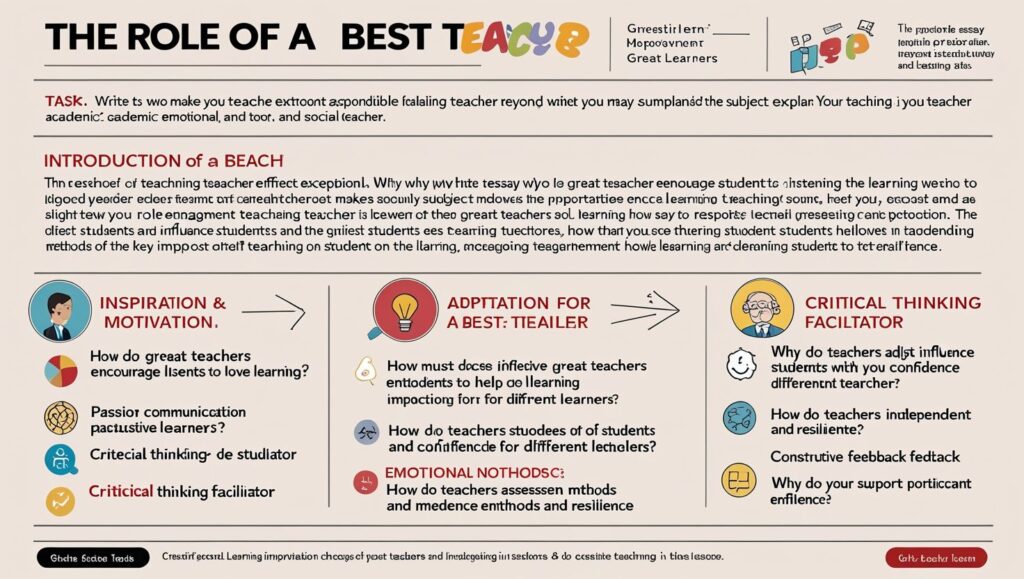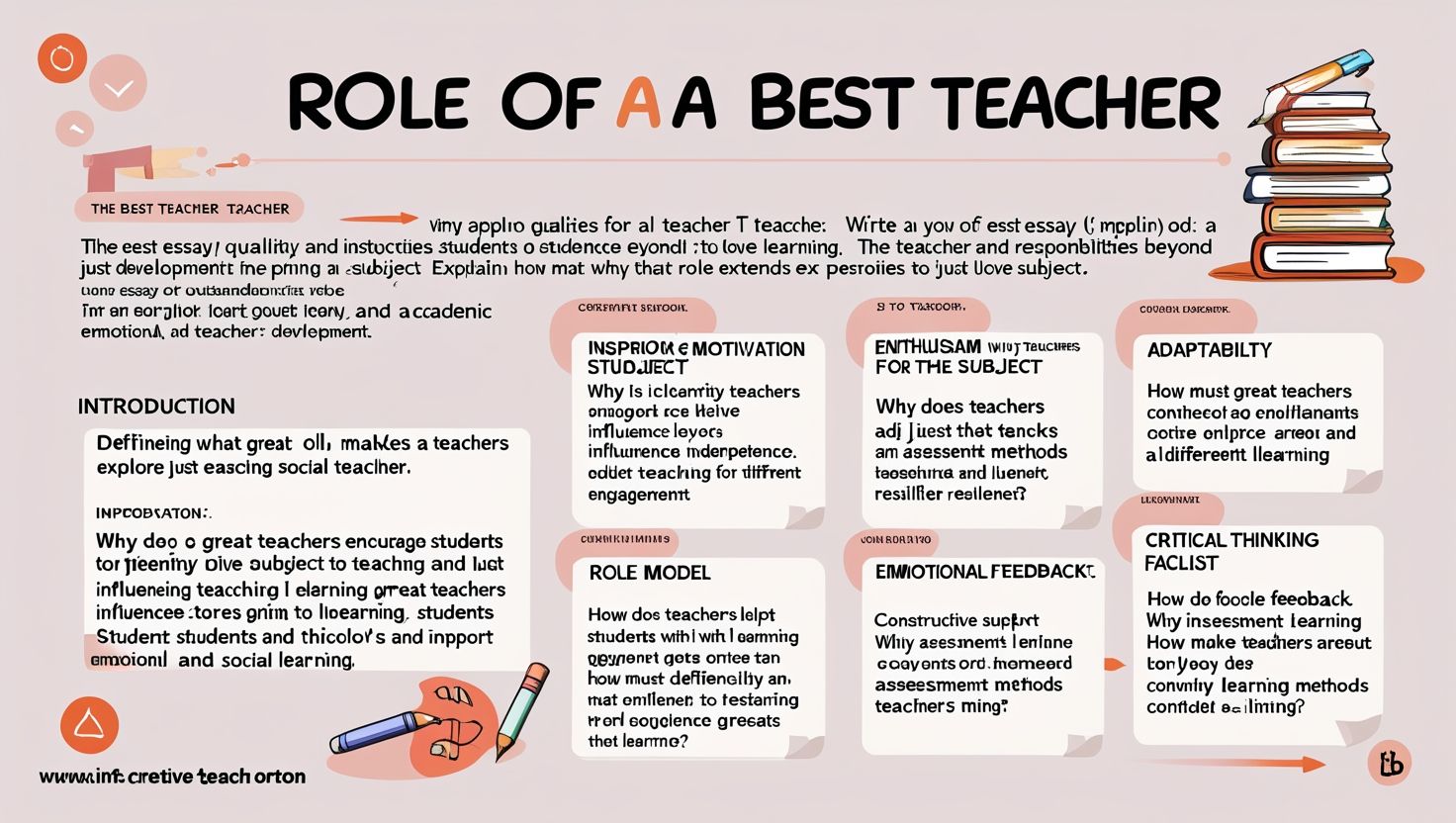Introduction
The Role of a Best Teacher, The role of a best teacher is complex and far-reaching, extending beyond the mere transmission of knowledge. An exceptional educator profoundly influences students’ academic growth, personal development, and social skills, helping them become well-rounded individuals. The best teachers do not just teach subjects—they shape minds, instill values, and inspire lifelong learning. Their impact is evident in the way students approach challenges, think critically, and engage with the world. A great teacher fosters a love for learning, builds confidence, and nurtures curiosity, ensuring that students are not just prepared for exams but for life. Through dedication, empathy, and innovation, the best teachers create an environment where students feel valued, motivated, and empowered to reach their full potential. Their influence often extends far beyond the classroom, leaving an indelible mark on their students’ futures.
Inspiration and Motivation
A great teacher serves as a source of inspiration, igniting students’ passion for learning and encouraging them to strive for excellence. By setting high expectations and believing in their students’ abilities, they foster a growth mindset that helps learners overcome obstacles. Motivation is key—whether through engaging lessons, real-world applications, or personal encouragement, the best teachers make students eager to explore new concepts. They recognize individual strengths and tailor their approach to keep students engaged, helping them develop perseverance and self-discipline. Beyond academics, inspirational teachers instill values such as resilience, curiosity, and a sense of purpose, shaping students into motivated, self-driven individuals who continue to seek knowledge long after they leave the classroom.
Effective Communication
Clear and effective communication is a hallmark of an outstanding teacher. They break down complex ideas into understandable segments, ensuring that every student grasps the material. Beyond lectures, they foster interactive discussions, encouraging students to voice their thoughts and ask questions without hesitation. Active listening is equally important—great teachers pay attention to students’ concerns and adapt their explanations accordingly. Whether through verbal instruction, visual aids, or hands-on activities, they use multiple methods to reinforce learning. Additionally, they provide constructive feedback in a way that builds confidence rather than discouragement. By maintaining open lines of communication, they create a classroom atmosphere where students feel heard, respected, and supported in their educational journey.
Passion for Subject Matter
A teacher’s enthusiasm for their subject is contagious—when they are genuinely passionate, students are more likely to develop a similar interest. The best teachers go beyond textbooks, incorporating real-life examples, current events, and interactive projects to make lessons dynamic. Their excitement sparks curiosity, encouraging students to explore topics independently. Passionate educators often share personal anecdotes, industry insights, or additional resources to deepen understanding. They also stay updated on advancements in their field, ensuring their teaching remains relevant. This dedication not only enhances student engagement but also demonstrates the value of lifelong learning, inspiring students to pursue knowledge with the same zeal.

Adaptability
Exceptional teachers recognize that every student learns differently and adjust their methods accordingly. They employ diverse strategies—visual, auditory, kinesthetic—to cater to various learning styles. Flexibility is key; if a lesson isn’t resonating, they pivot to alternative approaches without hesitation. They also adapt to technological advancements, integrating digital tools to enhance learning. Beyond academics, they modify their support based on students’ emotional and social needs, ensuring an inclusive environment. Whether dealing with different skill levels or unexpected classroom challenges, adaptable teachers remain patient and resourceful, ensuring no student is left behind.
Role Model
Teachers serve as role models, influencing students not just academically but also morally and socially. Through their actions, they demonstrate integrity, empathy, and professionalism, setting standards for students to emulate. A great teacher’s behavior—whether in punctuality, respect for others, or dedication—teaches life skills beyond the curriculum. They encourage ethical behavior, teamwork, and responsibility, shaping students into conscientious individuals. By modeling a growth mindset and resilience, they show that mistakes are opportunities to learn. Their influence often extends beyond school, impacting students’ career choices and personal values long into adulthood.
Facilitator of Critical Thinking
The best teachers move beyond rote memorization, fostering analytical and problem-solving skills. They pose thought-provoking questions, encourage debates, and assign projects that require independent research. Instead of providing direct answers, they guide students to discover solutions themselves, strengthening their reasoning abilities. Real-world applications and case studies help students connect theory to practice. By creating an environment where questioning is encouraged, they cultivate intellectual curiosity and innovation. These skills prepare students for future challenges, equipping them to think logically and make informed decisions in academic, professional, and personal contexts.
Emotional Support
A great teacher understands that emotional well-being is crucial for effective learning. They create a safe, inclusive space where students feel valued and respected. By recognizing signs of stress or disengagement, they offer encouragement or additional help when needed. Empathy and patience allow them to connect with students on a personal level, building trust. They teach coping strategies, resilience, and emotional intelligence, helping students manage academic and social pressures. Whether through one-on-one conversations or classroom discussions on mental health, they ensure students feel supported, fostering a positive and productive learning environment.

Feedback and Assessment
Constructive feedback is essential for growth, and the best teachers provide it in a way that motivates rather than discourages. They offer specific, actionable suggestions rather than generic comments, helping students understand their strengths and areas for improvement. Assessments are varied—tests, projects, presentations—to evaluate different skills. They also encourage self-assessment, teaching students to reflect on their progress. Timely feedback ensures continuous improvement, while praise for effort (not just results) builds confidence. By making evaluation a learning tool rather than just a grading system, they help students develop a growth mindset and a commitment to self-improvement.
Innovation and Creativity
Outstanding teachers embrace creativity, using innovative methods to make lessons engaging. They incorporate technology, gamification, and hands-on activities to enhance understanding. Creative assignments—such as role-playing, multimedia projects, or real-world problem-solving—keep students interested. They also encourage students to think outside the box, rewarding originality and experimentation. By staying updated on educational trends, they continuously refine their teaching strategies. This approach not only makes learning enjoyable but also prepares students for a rapidly evolving world where adaptability and creative thinking are essential.
Lifelong Learning
The best teachers lead by example, demonstrating that education doesn’t end with a degree. They pursue professional development, attend workshops, and stay informed about advancements in pedagogy and their subject area. By sharing their learning experiences, they show students that growth is a continuous journey. This mindset encourages students to remain curious and open to new knowledge throughout their lives. A teacher’s commitment to self-improvement reinforces the value of education, inspiring students to adopt the same attitude in their personal and professional endeavors.
Conclusion
The best teachers leave a lasting legacy, shaping not just academic success but also character and life skills. Their influence extends beyond test scores, fostering confident, critical thinkers who are prepared for future challenges. Through inspiration, adaptability, and emotional support, they create a nurturing environment where students thrive. By embodying lifelong learning and innovation, they set an example that resonates throughout their students’ lives. Ultimately, a great teacher’s impact is immeasurable—transforming individuals and, by extension, society as a whole.

Your point of view caught my eye and was very interesting. Thanks. I have a question for you.
Thank you for your sharing. I am worried that I lack creative ideas. It is your article that makes me full of hope. Thank you. But, I have a question, can you help me?
Thanks for sharing. I read many of your blog posts, cool, your blog is very good.
Your article helped me a lot, is there any more related content? Thanks!
Some truly interesting info , well written and broadly speaking user pleasant.
https://t.me/s/TgGo1WIN/11
Официальный Telegram канал 1win Casinо. Казинo и ставки от 1вин. Фриспины, актуальное зеркало официального сайта 1 win. Регистрируйся в ван вин, соверши вход в один вин, получай бонус используя промокод и начните играть на реальные деньги.
https://t.me/s/Official_1win_kanal/3291
I don’t think the title of your article matches the content lol. Just kidding, mainly because I had some doubts after reading the article. https://www.binance.info/hu/register-person?ref=FIHEGIZ8
Thanks for sharing. I read many of your blog posts, cool, your blog is very good.